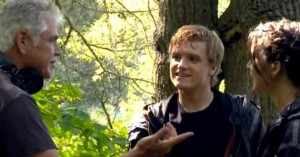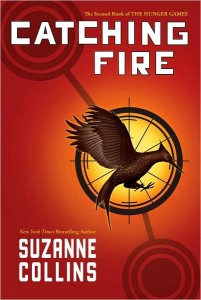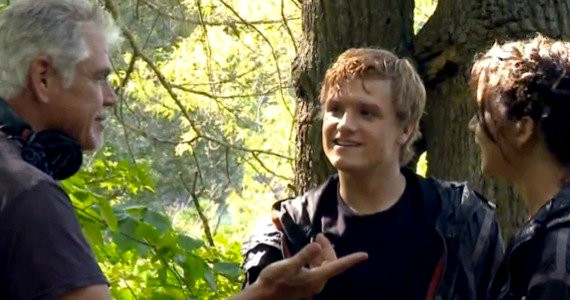Change and Stability in The Hunger Games Franchise
 Yesterday, Lionsgate announced that director Gary Ross has decided not to return to direct the second movie in the franchise, Catching Fire. The initial reaction from many fans and fan sites, including TheHob.org, naturally was disappointment. Ross did a fantastic job with the first movie, and received high praise from both the producers and the cast for their working relationships with him, so there was every reason to expect that his return for the next film would result in an equally compelling movie.
Yesterday, Lionsgate announced that director Gary Ross has decided not to return to direct the second movie in the franchise, Catching Fire. The initial reaction from many fans and fan sites, including TheHob.org, naturally was disappointment. Ross did a fantastic job with the first movie, and received high praise from both the producers and the cast for their working relationships with him, so there was every reason to expect that his return for the next film would result in an equally compelling movie.
Even before word was official, Yahoo! Movies among others had pointed out that successful franchises have had multiple directors, including highly profitable brands like Harry Potter, Twilight, and the one nearest to my heart: the Star Wars original trilogy. After the first Star Wars (later retitled A New Hope) became a mega-smash hit from George Lucas’ screenplay and directing, many people figured the sequel could never be as good. Then Lucas handed over the directing reins for The Empire Strikes Back to Irvin Kirshner and scriptwriting duties to Leigh Brackett and Lawrence Kasdan – and the rest, as they say, is history. For many Star Wars fans, Episode V is their favorite film; for quite a few others, it’s an unbreakable tie between ANH and ESB. The concluding film, Return of the Jedi, had a script by Kasdan and a third director, Richard Marquand, and triumphantly drew the trilogy to a close. Consistency of screenwriters and directors wasn’t needed to make the Original Trilogy a success – consistency with Lucas’ vision for the story was. It was Lucas’ role as executive producer, overseer, and visionary that made the trilogy succeed.
 I see every reason to think that Lionsgate is positioned to maintain a similar level of consistency with the subsequent movies in The Hunger Games series. Gary Ross may not be directing, but executive producer Nina Jacobson is the one who hired him – and her presence is just as strong as ever. Suzanne Collins, the story’s creator, is also maintaining a very active role in Catching Fire‘s production, including directly reviewing the script by Simon Beaufoy just as she did with Ross’ drafts for the first film. All the principal actors also will be back, and the returning locations (like District 12 and the Capitol) do not need to be scouted. The story of Catching Fire involves some significant shifts in tone and themes from the first book, so the second film will inherently have some noticeable differences from the first movie regardless – giving all the more reason to think that changing directors need not be particularly disruptive, especially if the new director is a good fit for the newer elements of the second movie. Ultimately, the key to the success of Catching Fire and later films will be to maintain consistency with Collin’s vision – and all of the elements are in place to help Lionsgate accomplish exactly that.
I see every reason to think that Lionsgate is positioned to maintain a similar level of consistency with the subsequent movies in The Hunger Games series. Gary Ross may not be directing, but executive producer Nina Jacobson is the one who hired him – and her presence is just as strong as ever. Suzanne Collins, the story’s creator, is also maintaining a very active role in Catching Fire‘s production, including directly reviewing the script by Simon Beaufoy just as she did with Ross’ drafts for the first film. All the principal actors also will be back, and the returning locations (like District 12 and the Capitol) do not need to be scouted. The story of Catching Fire involves some significant shifts in tone and themes from the first book, so the second film will inherently have some noticeable differences from the first movie regardless – giving all the more reason to think that changing directors need not be particularly disruptive, especially if the new director is a good fit for the newer elements of the second movie. Ultimately, the key to the success of Catching Fire and later films will be to maintain consistency with Collin’s vision – and all of the elements are in place to help Lionsgate accomplish exactly that.
Another factor that gives me confidence in Lionsgate is the very effective way they have managed the franchise to date. Ari Karpel at Fast Company wrote an excellent article discussing the “social media machine” Lionsgate created to roll out The Hunger Games to existing fans and the broader potential audience. It’s a fascinating read, and I recommend it to anyone interested in brand management, marketing, and promotion in the new online media and social networking environment. The primary focus was keeping fans engaged and excited, including frequent but carefully selected teasers online and in print. They also used the full range of social media to reach as many people as possible in the weeks leading up to release. Lionsgate also has a long-term strategy in place to keep The Hunger Games visible and interesting between now and the second film’s release late next year. The same strategies they used to build fan enthusiasm for the first movie can now be used to keep fans in the loop on developments for the next film – including the hiring of the director and the casting of key new characters like Finnick, Johanna, and Plutarch. Whatever disappointment or apprehension may have been generated by this week’s news could easily and quickly be surpassed by exciting news and teasers for Catching Fire. Especially if those updates from Lionsgate reaffirm the fans’ faith that Suzanne Collins’ vision will be faithfully portrayed yet again.
- Hyperspace Theories: SKELETON CREW Ahoy! - December 29, 2024
- Hyperspace Theories: WICKED Part I Rises to the Moment - December 6, 2024
- Columbia’s Vader™ Collection Launches Dec 5 - November 27, 2024











Kudos for writing this because I’m already tired of hearing about how Catching Fire is now doomed because Ross is not directing.
I think as long as Collins and Jacobsen are overseeing there’s a good chance the second movie will be as good as the first.